Just over 70 years ago, the dust lurking in the corners of our living rooms was an innocent mix of plant fibers, hair, and skin flakes. Today, it consists of roughly 50% petroleum-based materials.
The majority of what English speakers affectionately call dust bunnies is made up of textile fibers—fibers we shed every day simply by wearing our clothes and using home textiles.
This dust, our Lurch, is both a reflection of our consumption habits and a mirror of the global production philosophy of the textile industry. It’s an industry that produces “cheap” products which, on the one hand, don’t last long, but on the other, will outlive us by centuries. And there’s no end in sight—by 2050, the share of synthetic, plastic-based textiles like polyester is expected to triple.
– Alexandra Fruhstorfer
This April, we engaged in an insightful collaboration with Carla Mittersteig. As part of our two-year project on furniture upcycling (YEFECE), we had the opportunity to share our knowledge with staff and volunteers working at Carla. The workshop offered a space to develop new skills and deepen understanding of plastic—especially microplastics—as active agents in the circular economy. It’s an enormous topic, made approachable thanks to the guidance of experts Max Scheidl (Fantoplast) and Alexandra Fruhstorfer
The workshop followed the broader project themes of furniture upcycling and entrepreneurship and built upon an international training by our partner Circulab in Paris, as well as a previous workshop led by our trainee Max Scheidl and hosted at Fantoplast, a circular design company in Vienna.
Carla, the well-known second-hand store for furniture and textiles, is part of the larger organization Caritas. The collaboration with Caritas was a deliberate choice, rooted in the organization’s unique role as a socio-economic enterprise operating at the intersection of social responsibility and environmental action. At the Caritas warehouse, employees engage daily with reuse and recycling processes, making the principles of the circular economy and sustainability tangible through their work.
This environment provided the ideal setting for a participatory workshop that encouraged participants to explore and reimagine their daily interactions with materials and surroundings. In a safe and welcoming space for exchange and collaboration, the workshop strengthened emotional connections to one’s work, fostered accessible skill-building, and encouraged a playful expansion of personal perspectives.
The two-day program, prepared by our dynamic duo Fruhstorfer and Scheidl, included methods of introspection, dialogue, speculative design, concept development, experimentation, and reflection—all aimed at addressing the complex topic of sustainability from the participants’ work-related perspectives.
Participants began by writing down their questions and expectations, folding the paper into paper airplanes, and sending them flying through the room. The energy was set, and the workshop began. The air buzzed with ideas and opinions about microplastics and their undeniable presence in everything we do, touch, and wear.
Fürsthofer and Scheidl guided the group through the themes of sustainability and the circular economy using a specially designed card game. Next, the group took part in a Tactile Textile Bingo, where participants had to guess the material composition of textiles sourced from Carla’s sorting department. This knowledge was further developed through a fabric identification experiment, using fire and smoke as testing methods.
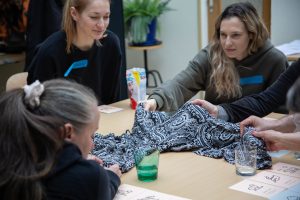
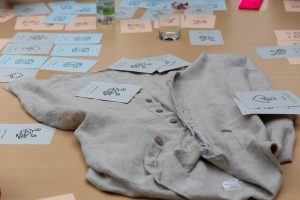
The second day featured a deeper discussion on the 3 R’s (Reduce, Reuse, Recycle) and the role of microplastics within the context of the circular economy. Participants were invited to apply their new knowledge to a selection of furniture pieces borrowed from the store. How could these items be reimagined to reduce plastic waste or simply made more sustainable?
The workshop culminated in a creative exercise: participants were tasked with developing a concept for a future profession for catching microplastic that have already entered our environment and designing the tools needed to carry it out. The ideas were innocent and playful—yet they may prove to be vital in shaping a future we can still look forward to.
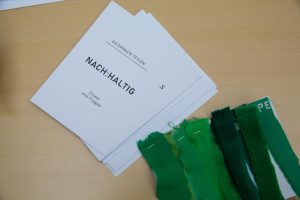
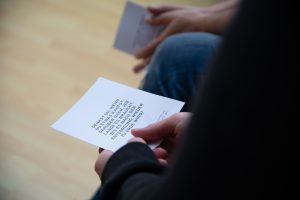
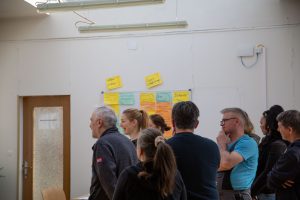
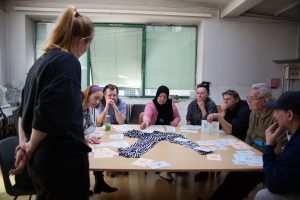
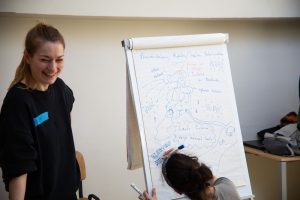
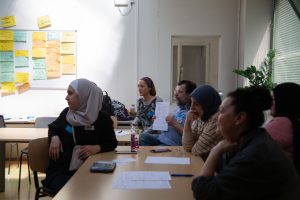
More Info Link